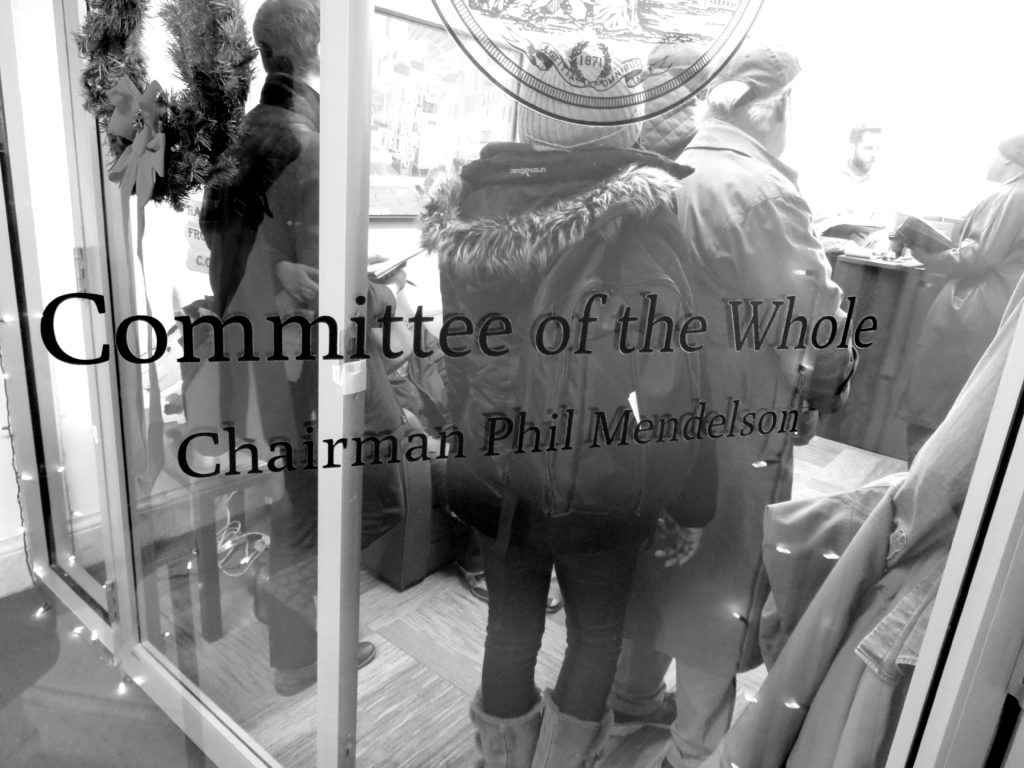A group of two dozen housing advocates hand delivered policy proposals to the offices of the mayor and D.C. councilmembers on Dec. 20 as part of a larger campaign to boost local funding for affordable housing programs.
Volunteers joined the People for Fairness Coalition, a group of homeless and formerly homeless activists, in getting a head start on D.C. Council budget season, which will pick up steam this month.
The activists started the day in a reception-sized tent across from the Wilson Building in Freedom Plaza. Some had slept there after the previous night’s vigil, which honored the 81 people who had died so far in 2019 while experiencing homelessness.

Before the group delivered the policy proposals, Aja Taylor, advocacy director at Bread for the City, gave a brief lesson on lobbying D.C. Council.
“We have to come in with that same overt confidence, with the same understanding that this is a conversation between me and someone who works for me about something that I’m owed,” Taylor said.
Among the coalition’s demands is that the District government invest $1.5 billion to create and preserve housing for low-income residents. That would include $215 million to repair the District’s crumbling public housing stock and an additional $215 million to create new public housing units. The rest of the $1.5 billion is split between the Housing Production Trust Fund, the Local Rent Supplement Program, and various housing interventions outlined in the Homeward D.C. strategic plan to end homelessness.
The D.C. Housing Authority, which depends on federal funding to manage the District’s public housing, is facing a lengthy backlog of repairs and a voucher wait list with about 40,000 names on it.
The Comprehensive Plan, an evolving document guiding growth in the District, includes a provision to support the housing authority “by studying the need for additional units and developing strategies to meet the needs of existing units.”
For the People for Fairness Coalition, that’s not enough. Coalition member Reginald Black said it’s time District government uses local funds to compensate for the federal government’s divestment from public housing.
“We’re not saying to fund a study. We’re saying to fund an action,” said Black, who is also a Street Sense Media vendor and artist.
More than one study in the past year has shown Washington, D.C., to have soaring rates of gentrification and displacement of long-time residents of color.
“We truly believe that when you start talking about racial equity, equity needs to come with people being able to attain housing that’s universally affordable to them,” said People for Fairness Coalition Director Robert Warren, who is also a Street Sense Media vendor and artist.
In addition to making an historic investment in low-cost housing, the coalition wants D.C. Council to consider the Michael A. Stoops Anti-Discrimination Amendment Act. The bill, initially introduced by at-large Councilmember David Grosso in 2017, would prohibit discrimination based on one’s housing status.
The D.C. Human Rights Act protects against discrimination based on source of income, employment and numerous other traits. But refusing services and employment to people because they’re unhoused is currently legal, an attorney at Neighborhood Legal Services Program previously told Street Sense Media.
The 2017 iteration of the bill died in the Committee on Judiciary and Public Safety because the panel’s chairman, Ward 6 Councilmember Charles Allen, never gave it a hearing. Now the bill awaits action in the Committee on Government Operations. Ward 4 Councilmember Brandon Todd chairs that panel and controls whether the legislation advances. Todd, who is a co-sponsor of the bill, has yet to take action.
After Aja Taylor’s advocacy lesson, Warren and Black led the group to the Wilson Building.
There they met with representatives from the offices of the mayor and numerous councilmembers.
Most lawmakers were not available to meet with coalition members. Representatives from the offices of most councilmembers said they would take the policy recommendations into consideration come budget season and meet with the coalition at a later date.
When members of the coalition entered the office of Ward 2 Councilmember Jack Evans, he was there to take their recommendations in person.
He couldn’t meet with them for long, though, because he was busy packing cardboard boxes.








